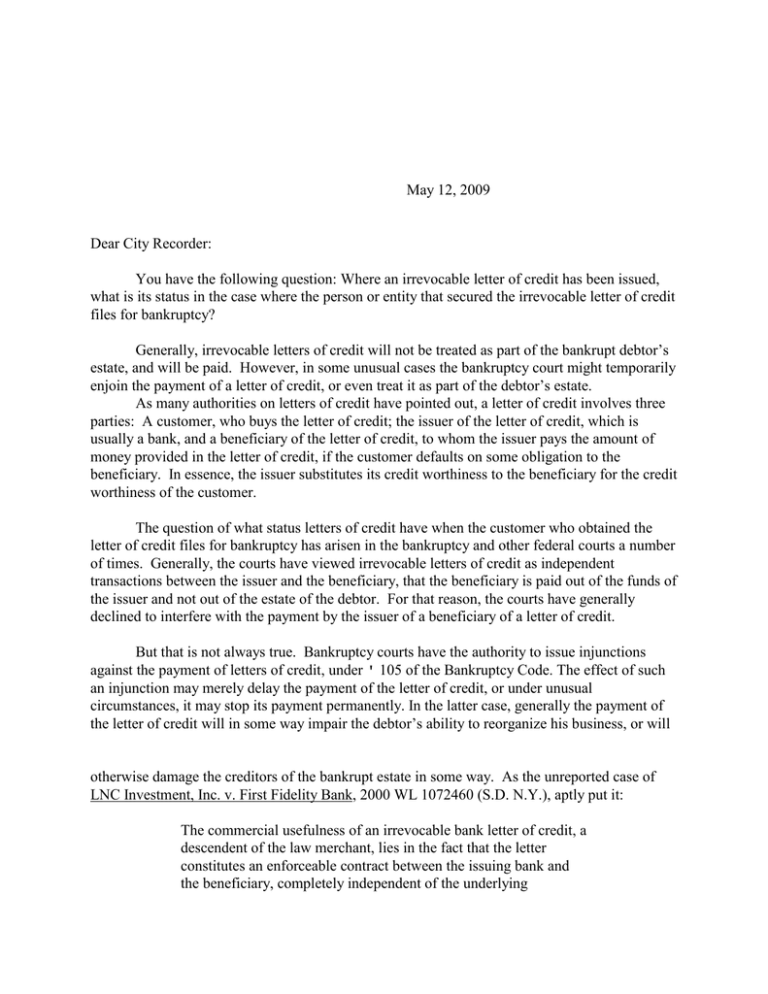May 12, 2009 Dear City Recorder:
advertisement

May 12, 2009 Dear City Recorder: You have the following question: Where an irrevocable letter of credit has been issued, what is its status in the case where the person or entity that secured the irrevocable letter of credit files for bankruptcy? Generally, irrevocable letters of credit will not be treated as part of the bankrupt debtor’s estate, and will be paid. However, in some unusual cases the bankruptcy court might temporarily enjoin the payment of a letter of credit, or even treat it as part of the debtor’s estate. As many authorities on letters of credit have pointed out, a letter of credit involves three parties: A customer, who buys the letter of credit; the issuer of the letter of credit, which is usually a bank, and a beneficiary of the letter of credit, to whom the issuer pays the amount of money provided in the letter of credit, if the customer defaults on some obligation to the beneficiary. In essence, the issuer substitutes its credit worthiness to the beneficiary for the credit worthiness of the customer. The question of what status letters of credit have when the customer who obtained the letter of credit files for bankruptcy has arisen in the bankruptcy and other federal courts a number of times. Generally, the courts have viewed irrevocable letters of credit as independent transactions between the issuer and the beneficiary, that the beneficiary is paid out of the funds of the issuer and not out of the estate of the debtor. For that reason, the courts have generally declined to interfere with the payment by the issuer of a beneficiary of a letter of credit. But that is not always true. Bankruptcy courts have the authority to issue injunctions against the payment of letters of credit, under ' 105 of the Bankruptcy Code. The effect of such an injunction may merely delay the payment of the letter of credit, or under unusual circumstances, it may stop its payment permanently. In the latter case, generally the payment of the letter of credit will in some way impair the debtor’s ability to reorganize his business, or will otherwise damage the creditors of the bankrupt estate in some way. As the unreported case of LNC Investment, Inc. v. First Fidelity Bank, 2000 WL 1072460 (S.D. N.Y.), aptly put it: The commercial usefulness of an irrevocable bank letter of credit, a descendent of the law merchant, lies in the fact that the letter constitutes an enforceable contract between the issuing bank and the beneficiary, completely independent of the underlying May 12, 2009 Page 2 transaction between the beneficiary and the bank customer whose instructions caused the bank to issue the letter. The bank is absolutely obligated to pay the stipulated amount to the beneficiary upon timely presentation by the beneficiary to the bank of a draft accompanied by documents conforming to the letter of credit. Banks have no interest in using their own funds to make payments under letters of credit they have issued. Accordingly a bank will not issue an irrevocable letter of credit to a beneficiary until it has made arrangements satisfactory to itself to ensure that the bank will be able to look to its customer, upon whose instructions the letter was issued, as the ultimate source of any payments made under the letter. [At 2] [Emphasis is mine.] Generally, it is the arrangements that the customer has made to pay the bank for any payment that the bank has made to the beneficiary under the letter of credit that causes the courts problems in some cases. What arrangements the customer (who has subsequently gone bankrupt) has made to pay the bank may affect debtor’s ability to reorganize his business, or may affect the assets in his bankrupt estate, particularly where he has used his property to secure the letter of credit. In your case, the irrevocable letter of credit is for $50,000. The “customer” who obtained the letter of credit was a developer, the issuer of the letter of credit was a bank, and the beneficiary of the letter of credit is the White Pine Planning Commission. The letter of credit is payable by the issuing bank to the White Pine Planning Commission if the developer does not complete final paving for a certain development. While I cannot say for certain that the letter of credit in your case is not threatened by any agreement the developer has made with the bank to secure from it the letter of credit, I think that the White Pine Planning Commission’s ability to collect on that letter of credit is reasonably sure. [See In re Prime Motor Inns, Inc., 130 B.R. 610 (S.D. Fla. 1991), Lower Brule Construction Co. v. Sheesley’s Plumbing & Heating Co., 84 B.R. 638 (D. S.Dakota 1988).] As the latter case points out, there was no evidence that the letter of credit was secured by the contractor who had gone bankrupt, but even if that had been the case, if the bank paid the letter of credit, “it may then claim indemnification under the contract giving rise to a claim against the estate of the party purchasing the letter who is now in bankruptcy,” in which case, continued the court, the “[p]ayment of the letter will only result in a change of identity of the creditors of the debtor.” [At 645] The same case declares that in order for a court to enjoin the payment of a letter of credit: May 12, 2009 Page 3 (1) There must be a danger of imminent irreparable harm to the estate or to the debtor’s ability to reorganize; (2) there must be a reasonable likelihood of a successful reorganization, (3) the relative harm between the debtor and the entity which would be restrained must be balanced; and (4) the public interest in successful bankruptcy reorganizations must be balanced against other competing societal interests. [Citing In re Guy C. Long, Inc., 74 B.R. 939, 944 (Bankr.E.D. Penn. 1987) [At 645] It appears to me that, given the relatively small size of the letter of credit, and the fact that it is payable to a municipality for uncompleted public works for which taxpayers would likely be ultimately responsible, the balancing test would tip in favor of the payment of the letter of credit. Let me know if I can help you further in this or any other matter. Sincerely, Sidney D. Hemsley Senior Law Consultant SDH/ . .





